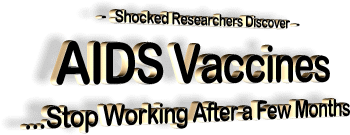|

by Ethan A. Huff
staff writer
April 03, 2010
from
NaturalNews Website
An experimental new AIDS vaccine is
proving to be effective for only a very short time, according to
researchers who have been finding it difficult to explain whether or
not the drug is actually useful.
Dr. Nelson Michael, a colonel at
the Walter Reed Army Research Institute of Research in
Maryland, and his team observed only a minor, temporal benefit in
patients who took the vaccine, followed by a decline in efficacy.
The experimental vaccine is a combination of Sanofi-Pasteur's ALVAC
canarypox/HIV vaccine and VaxGen's AIDSVAX.
After
AIDSVAX was found to be ineffective
in 2003, researchers decided to combine it with
ALVAC to see if that combination
would work. Early results appeared to show that the vaccine reduced
the risk of becoming infected with AIDS by 31 percent.
However within a year, the risk level
seemed to return back to normal.
At the Conference on Retroviruses and Opportunistic Infections in
San Francisco, the team explained that they may be able to come up
with a new trial to verify the legitimacy of the vaccine. Dr.
Michael said he plans to work with Dr. Anthony Fauci from the
U.S. National Institute of Allergy and Infectious Diseases to
develop new trials to be conducted in Asia or Africa.
It is important to note that studies conducted on vitamins and
nutrients showing positive results are usually accompanied with
disclaimers by researchers that further study is needed to verify
the results. In this case, researchers have been working overtime to
defend the legitimacy of the experimental AIDS vaccine trial,
despite the fact that they admit the results are questionable and
they cannot determine whether it was actually a success.
The team plans to follow up the study by evaluating blood samples
from vaccinated participants to measure their antibody levels. They
hope to find evidence that the vaccine is exerting some kind of
influence on participants' immune systems.
Previous AIDS vaccines have all proven to be a failure.
In 2008, two of the most viable options gathered from a 20-year
search not only failed to provide protection from the disease but
actually increased one's risk of becoming infected with AIDS.
Since its first discovery in the 1980s, it is estimated that roughly
25 million people have died from AIDS.
Various combinations of pharmaceutical
drugs are offered to AIDS patients to help control the disease, but
according to mainstream experts, there is no cure for it.
Sources:
|
